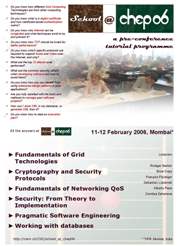|
|
|
Printable Version |
|
Welcome to
School@chep06 |
|
It has become a tradition is many conferences to organize tutorials during
the days preceding the main events.
This usually allows attendees to get
familiar with some of the topics in an academic-style manner, and therefore
increase the effectiveness of their participation.
chep is no
exception, and we inaugurate with chep06 a tutorial programme that we called
School@chep06.
|
 Download
Poster Download
Poster
(pdf) |
|
This first school is organized in collaboration with the
CERN School of Computing (CSC). It also
capitalizes on the experience gained with the
inverted CSC (iCSC), where
young attendees to the previous school turned into teachers,
combining their skills
and going one step
further.
Six topics have
been selected for school@chep06,
3 of them delivered by experienced lecturers, and three others by younger
specialists having taught at the last iCSC.
The programme, a mix of fundamental and novel
subjects, has been designed to meet the needs not only of conference
attendees, but also of local engineers or computer scientists interested in
getting either an overview or a in-depth presentation of some of the most
challenging and timely topics.
François Fluckiger
School coordinator |
|
A
few questions |
-
Do you
know how different Grid
Computing
Technologies are from
other computing techniques?
-
Do you
know what is a digital
certificate and how
certificate-based authentication
works?
-
Do you
know why Internet can be
congested and what
techniques exist to try and prevent it?
-
Do you
know how TCP should be tuned for
better
performance?
-
Do you
know which specific protocols are required to support
Audio and
Video over the Internet,
and why?
-
What are
the top 10 attacks ever
performed?
-
What are
the common security pitfalls when
developing software and how to avoid them?
-
Do you
know how you can benefit from using
enterprise
design
patterns in your
applications?
-
Are you
fully satisfied with the tools and methods to
manage your
software
projects?
-
How can I
store
XML in my database, or
generate
XML from it?
-
Do you
know how to read an execution
plan?
All the answers at
School@chep06
|
|
|
What is
School@chep06?
|
School@chep06
is a
programme of tutorials associated with chep06. |
|
When does it take place? |
School@chep06
takes
place the week-end preceding the chep06 conference: Saturday 11th
and Sunday 12th of February 2006. |
|
Why a school a chep06? |
The objective of
School@chep06 is twofold:
·
School@chep06
will
provide background knowledge to attendees of the conference,
increasing the efficiency of their participation.
·
School@chep06
will
also offer to local computer scientists who may not attend the
conference, a unique opportunity to discover new hot topics or to
deepen their knowledge in several others. |
|
What is the format of the school? |
The programme is formed of 6 independent though consistent
lecture series. Each lecture series comprises 3 hours and
lasts one half-day
The programme comprises 16 hours of tuition in total. |
|
How are the two days organized? |
Two
lecture series take place on the Saturday 11PthP, one in the morning and the other in the afternoon.
Four
lecture series take place the Sunday 12PthP: two series in parallel in the morning, and the two other
series in parallel in the afternoon.
Participants are free to select the series they wish to attend
the second day.
At the end of the second day, a short summary of each of the
Sunday parallel series will be proposed, for those participants
having selected another series. |
|
What type of tuition is offered? |
The lecture series are of two types:
1.
Three lecture series on Fundamentals
2.
Three lecture series on Advanced or Novel topics |
|
What are the 6 lecture series? |
Lecture series on Fundamentals:
1.
Fundamentals of Grid Technologies
2.
Computer Security 1: Cryptography and Security Protocols
3.
Fundamentals of Networking QoS
Lecture series on Advanced or Novel topics:
4.
Computer Security 2: From Theory to Implementation
5.
HPragmatic
Software EngineeringH
6.
Working with databases and database-centric interfaces |
|
|
Where does the team of lecturers come from? |
The lecturer team capitalizes on the experience gained at the
CERN School of Computing (CSC) as well as on the
recent experience of the Inverted School (iCSC):
Where students turn into teachers.
·
The programme on fundamentals will be taught by three
experienced lecturers.
·
The programme on more advanced topics will be taught by
three younger lecturers, all former successful lecturers at the
1PstP Inverted School given at CERN in 2005. |
Who are the
lecturers? |
|
# |
Lecture Series |
Lecturer |
Affiliation |
|
1 |
Fundamentals of Grid Technologies |
Rüdiger Berlich
|
Forschungszentrum Karlsruhe (FZK)
Karlsruhe, Germany |
|
2 |
Computer Security 1:
Cryptography and Security Protocols |
Alberto Pace
|
CERN, IT Dpt
Geneva, Switzerland |
|
3 |
Fundamentals of Networking QoS |
François Flückiger |
CERN, IT Dpt
Geneva, Switzerland |
|
4 |
Computer Security 2:
From Theory to Implementation |
Sebastian Lopienski
|
CERN, IT Dpt
Geneva, Switzerland |
|
5 |
HPragmatic
Software EngineeringH |
Brice Copy
|
CERN, IT Dpt
Geneva, Switzerland |
|
6 |
Working with databases and database-centric interfaces |
HZornitsa
ZaharievaH
|
CERN,
AB Dpt
Geneva, Switzerland |
|
|
What material will be made available? |
The presentation material will be distributed to the
participants in the form of a complete booklet at the beginning of
the school. |
|
Organization |
François Fluckiger Coordinator
Sunanda Banerjee Local Organizer
Leena
Chandran-Wadia Local Organizer
Fabienne Baud-Lavigne Administrative Assistant |
|
|
| For more information, contact
Fabienne (dot) Baud-Lavigne (at) cern (dot) ch |
|
|